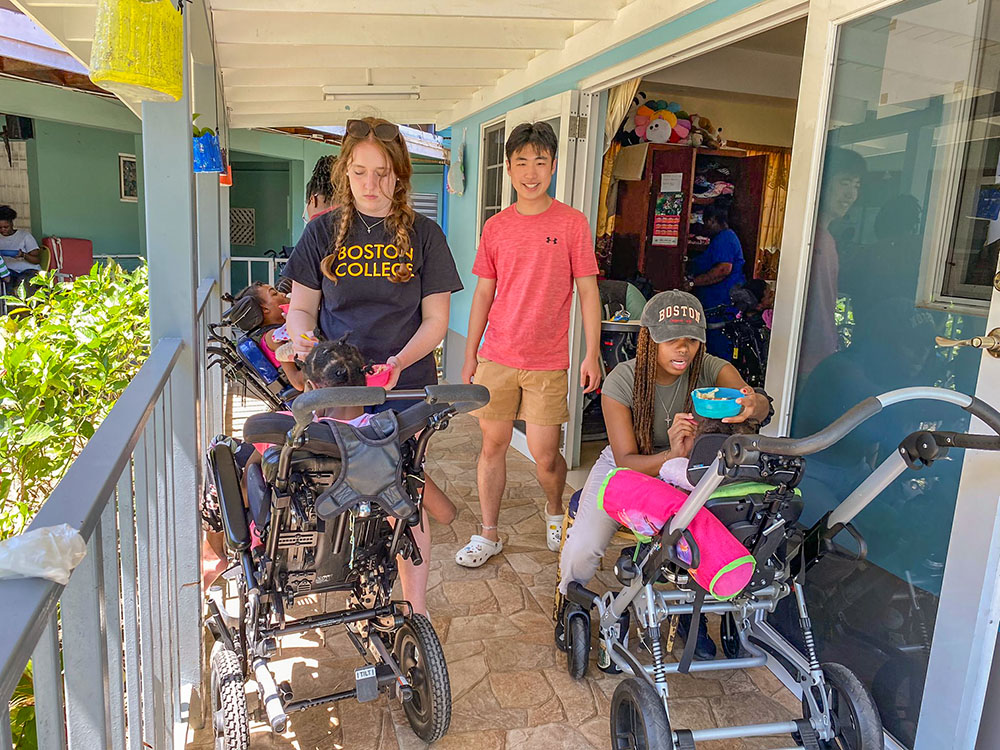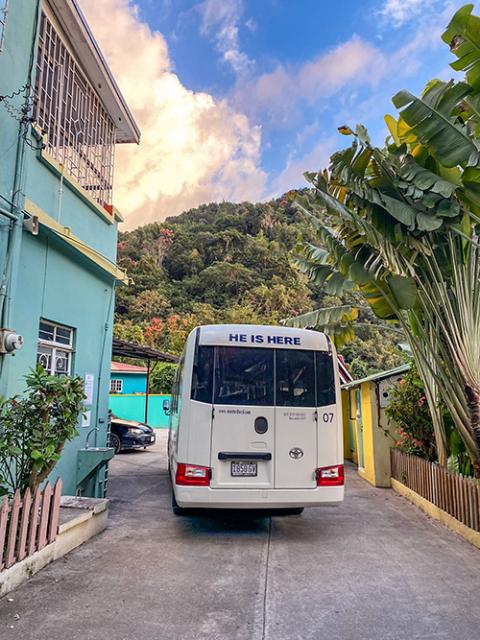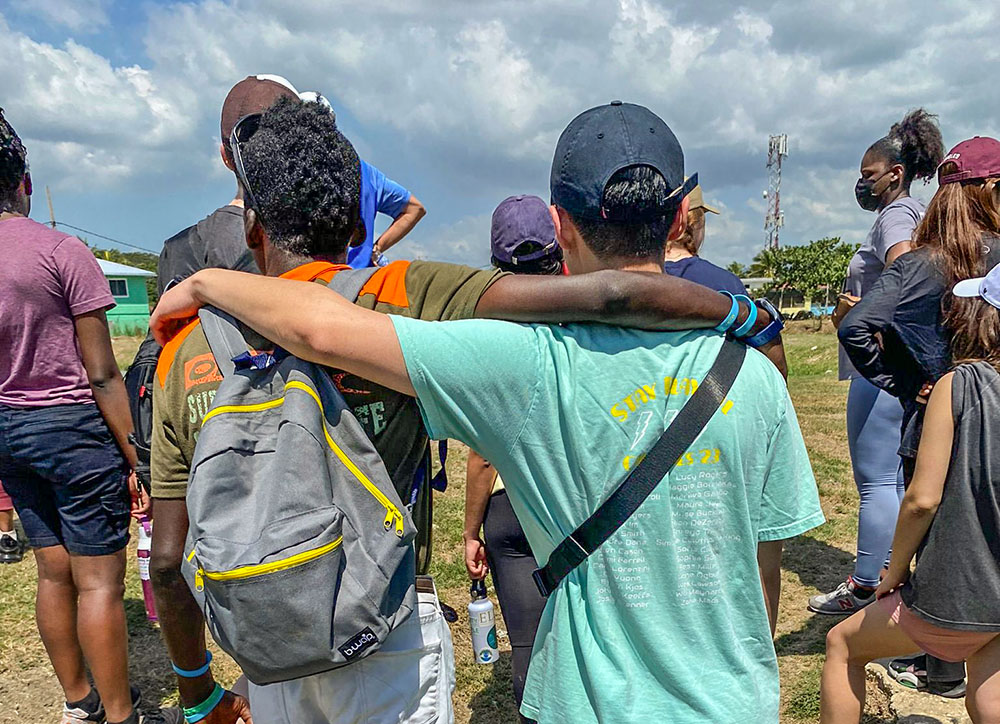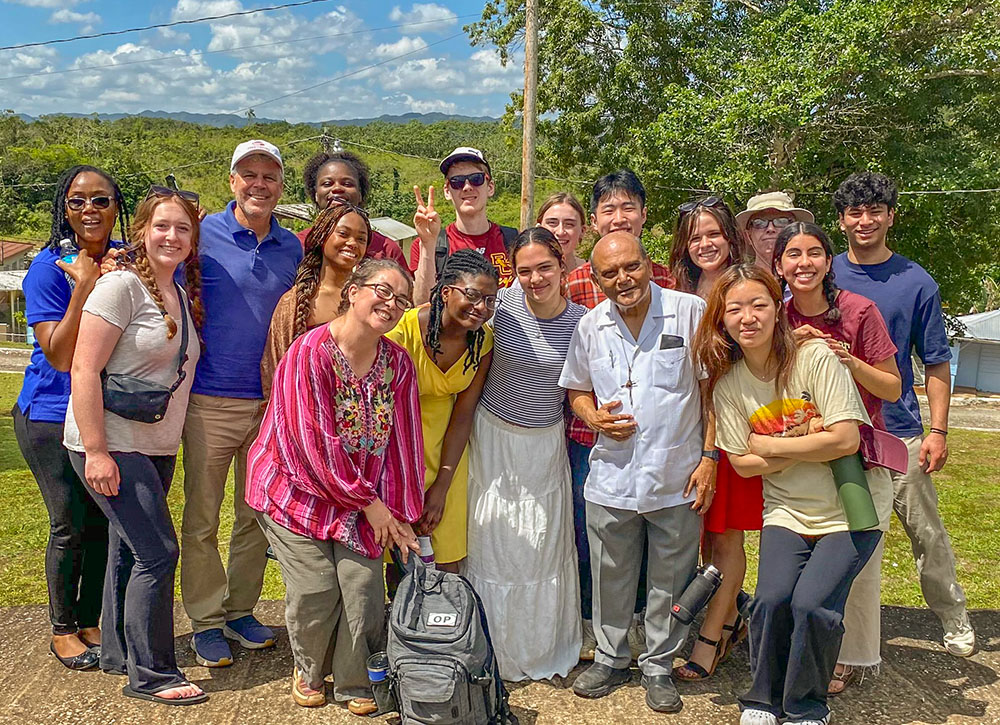
Volunteers provide nourishment and care to residents in need at Jamaica Mustard Seed in Kingston, Jamaica. (Ana González)
As an undergrad, I made it a habit to listen to the news at all times, read the paper once a day, and make the commitment to stay informed. A shift took place in 2018, and from being informed and in touch, I became alarmed and detached.
It is not the news or social media's fault. At the time, I became hyper-focused on the betrayal, injustice and abuse reported in the news and showcased in social media. I found myself getting rattled up and perturbed to the point of losing my sleep. It was overwhelming and it made me feel powerless.
It was at this time that I decided to reduce my news and social media intake to 30 minutes per day. My decision enabled me to control my intake of uncomfortable and ugly reality for a limited time. For the rest of my day, I intentionally focused my attention on beauty, blessings and hope.
My outlook on the news spread throughout my life, even in my relationship with Jesus. I became comfortable with Jesus the beautiful teacher, Jesus the divine blessing, and Jesus the resurrected hope. I looked at the Jesus of Good Friday briefly and carried on with the resurrected Jesus.
Finally, I came to face the reality that I intentionally avoided Jesus the violated, the wounded, the betrayed, the disadvantaged.
Advertisement
A few weeks ago, I had the opportunity to join a group from the Boston College Volunteer and Service Learning Center on a mission trip to Jamaica Mustard Seed, a home for children with disabilities on the outskirts of Kingston, Jamaica. In preparation for the mission trip, the group studied the circumstances that created the conditions of abandonment and marginalization of children with serious physical and mental handicaps. The preparation for the service trip served as an invitation to move beyond looking at the ugliness of sin and work my way to encountering the Jesus of Good Friday.
Upon our arrival, I recall feeling overwhelmed and angered by the pain of unfair socioeconomic conditions that abandoned handicapped children experience. Initially, I felt uncomfortable and inadequate in feeding or holding the residents.
Jesus the teacher, in the form of one of the nurses, reminded me of Matthew 25:40: "Whatever you did for one of these least brothers (sisters) of mine, you did for me." Suddenly, the experience forced me to see and encounter in the disabled residents the Jesus of Good Friday.

Sophie's Place is the central hub for service and accommodation in the Jamaica Mustard Seed program in Kingston, Jamaica. (Ana González)
Early on in the experience, one of the residents, a 2-year-old, started to cry. I headed over to try to calm the boy down by singing him a song. The head nurse, Aunty Brise, informed me that the boy wanted to be held. She proceeded to remove him from his chair and hand him over to me.
In holding him, I was shocked at the tension in his arms and legs and did not want to hurt him by holding him wrong. I was very uncomfortable. Then as I proceeded to hold the child, the tension in his limbs softened and his body embraced mine. The toddler suddenly granted me the honor and gift of an embrace and priceless interaction.
On another occasion, I encountered a young lady who invited me to color with her. While we did not talk much, she invited me to be present, sit with her, and help her choose colors. She would reach out and touch my hand, letting me know that she saw me, and acknowledged me.
Following her example, I repeated the action. I saw her, I acknowledged her and was grateful for the gift of her time and joyful smile.
As the mission experience progressed, I moved beyond looking to seeing and experiencing. I found inspiration in the loving interactions between the nurses, staff and residents. Jamaica Mustard Seed was created to address the ugliness of sin, becoming a glimpse of the kingdom of God.
I found my experience filled with surprise. Instead of sadness and abandonment, I found joy. I encountered loving nurses, cooks and staff who embodied the example of Jesus, who modeled genuine, heartfelt mercy in their patient care of the young residents. In turn, the children welcomed every kindness. They welcomed us with open arms, embraced us and shared their love generously.

A resident of Jamaica Mustard Seed in Kingston, Jamaica, and a student from the Boston College mission group form a heartwarming friendship. (Ana González)
I made peace with the notion that I could not change the systemic structures that cause indignity, marginalization and pain for the residents of Jamaica Mustard Seed. While I felt anger at the situation, I was reminded to follow the example of Jesus, the nurses and residents in practicing mercy, to be open to encounters from the heart and to accompany those I met.
Most importantly, I recalled my invitation to follow all of Jesus; the teacher, the cosmic divine, the resurrected hope, the mangled, the abused and the disabled.
During the mission at Jamaica Mustard Seed, I expected to find Jesus, the marginalized and suffering — and I did. But I also witnessed Jesus, the apostolic teacher. I was reminded that God is working every day in the chaos and mess of sin. At Jamaica Mustard Seed, the residents and their caregivers can laugh, dance and sing with the hope of God's love. And we, on our Good Friday journey through Jerusalem, can find joy as well.
Just as their placement at a hospital is not the end of the story for the children at Jamaica Mustard Seed, today, of all days, we are reminded that the Passion is not the end of the story for all of us.
Good Friday reminds us that suffering caused by sin is part of our journey. We remember, our incarnate God shared the experience of pain and suffering. In the person of Jesus, God accompanies us in our deepest pains. But in contemplating and praying about Good Friday and the Passion, I am reminded that today is all about a love greater than sin. Just as in the midst of pain, I saw smiles, embraces and love, in the midst of Christ's pain and passion, I find salvation.

The group from the Boston College Volunteer and Service Learning Center gathers around Msgr. Gregory Ramkissoon (front row, second from right), the founder of Jamaica Mustard Seed, during the group's visit to Kingston, Jamaica. (Courtesy of Ana González)
The cross and the journey of Good Friday are central to my experience of the triune God. With my community, my family and the church, I continue to walk through Jerusalem. I encounter sin, sadness, sorrow and death — but at the end of my journey is the joy of everlasting life.
As a pilgrim church today, we journey with Jesus toward the cross. The liturgy of Good Friday describes the betrayal, injustice and disturbance caused by sin. We are meant to feel uncomfortable and go beyond the beauty, blessings and hope.
It does not take much to witness the passion of Jesus lived out around us. The evening news is loaded with examples of abuse, unfairness and the ugly effects of sin, and it can be hard to move beyond the pain. Sometimes, the consequences of sin are so overwhelming that it is hard to look at anything else.
As we travel with Jesus on Good Friday, we must move beyond looking and embracing wounded Jesus.
On this most holy of days, much of our focus is on the act leading to the Crucifixion. We become face to face with a human dimension of Jesus that can be hard to see and experience. I am reminded that the pain is just part of the journey, not our destination. As we pass through the Valley of Death, we fear no evil because we are with someone who understands our pain, who feels our pain, who sees our sin and loves us nevertheless.
In the pain we see, the hurt we try to heal, the sins for which we ask forgiveness, we hold to the hope of resurrection. Death is not the end of our story, but rather, a life with our Lord.







